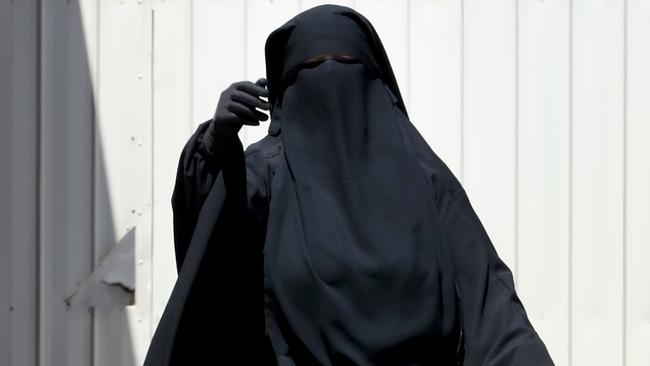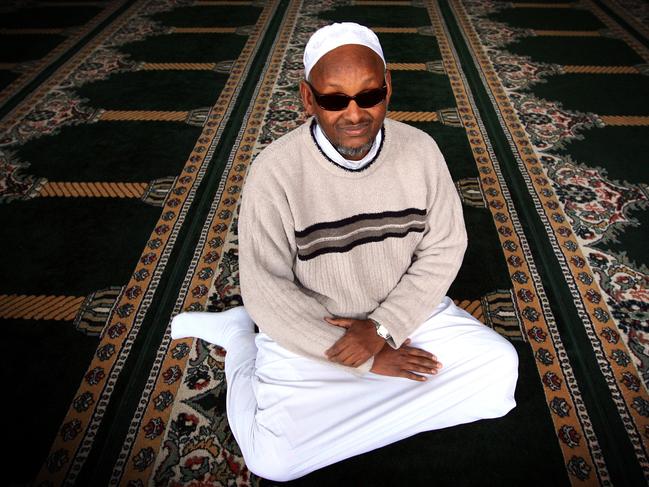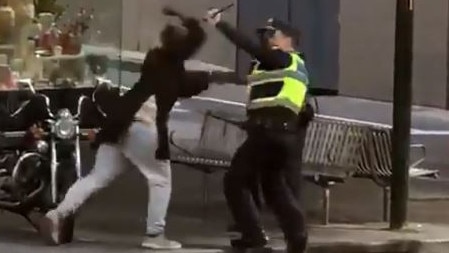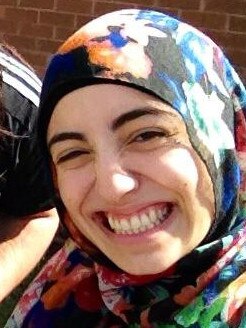Radicalised in our suburbs and a threat to public safety
Hassan Khalif Shire Ali’s family thought their worry was over when he married and became a dad. But the trouble was only beginning.

Hassan Khalif Shire Ali was the perfect Islamic State recruit.
When the murderous regime was sweeping across northern Syria and Iraq, he was a 20-something high school dropout who couldn’t hold down a job, was withdrawn from his family and was turning increasingly to religion to give purpose to his otherwise directionless life.
He’d dabbled in drugs, had minor brushes with the law and was prone to bouts of depression and paranoia. It had been years since he had attended his family’s mainstream mosque but elsewhere, in small prayer groups and perhaps online, he had found new meaning in Islam. As his brother-in-law, Evren Eren, told a friend in a November 2015 Facebook post, “he know his religion very well but too lazy, doesn’t work”.
These are the people Islamic State sought out from across the Western world: young, disengaged Muslims with seemingly bleak prospects; troubled minds that could be manipulated easily; people on the fringe of a dreary suburban life who could be given purpose in the defence of the caliphate.
This is who ASIO thought Shire Ali was in 2015 when it cancelled his passport and stopped him travelling overseas.
This is someone Khalif Shire Ali doesn’t recognise as his son.
Khalif Shire Ali understood the value of work. He arrived in Australia in 1989, leaving his wife and young family back in Somalia while he laboured and saved enough money to fly them over.
His first job, on the assembly line of a local factory, ruined his back. He applied for compensation, was refused, and spent the rest of his working life driving a cab. His family, including little Hassan, joined him after the outbreak of the Somalian civil war, a conflict that in its first year led to the deaths of an estimated 300,000 people from starvation.
His wife worked in childcare and, between them, they bought a comfortable home in Werribee, in Melbourne’s west, and put enough money aside to send their four sons and two daughters to a low-fee, private Islamic school in neighbouring Truganina, Al Taqwa College. Some of them went to university. Hassan didn’t get through Year 12.
Sheik Isse Musse, the former long-serving imam at Werribee’s Virgin Mary mosque where the Shire Ali family prayed, is a trusted friend of Shire Ali’s father. He doesn’t claim to know Hassan well but has witnessed the torment he caused his father. For two years, the father received only one phone call from his son.

Even when Hassan became a father, 15 months ago, he made no attempt to mend the family rift.
When Shire Ali was stopped at Melbourne’s airport in 2015, his family didn’t know he was planning a trip. “Hassan was not on speaking terms with his family,” the imam tells Inquirer. “They heard that his passport was cancelled but he would not talk to them. They asked ‘why, what had he done’, but he would not tell them anything.
“For the last six or seven years he was like that. When he married, the family felt at ease, thinking he would be more responsible and behave better. Parents always have hope that their children will turn good. But still it continued. He did not make any change.”
In the same year Shire Ali’s passport was cancelled, ASIO agents knocked on the door of the family home in Werribee, asking about Hassan’s whereabouts.
It was after the murder of Curtis Cheng, when counter-terrorism agencies were in a state of hyper vigilance. They wanted to know how Shire Ali fitted into the broader, extremist networks centred on the Al-Furqan prayer centre in Melbourne’s southeast and the Al Risalah bookstore in Sydney’s west, why his social media contacts included one of Australia’s most bloodthirsty jihadists, Khaled Sharrouf. They always came when his parents weren’t home.
Until the day of his horrific attack in Bourke Street, Shire Ali’s family kept trying to help him. For the last three months of his life, his father paid the rent on the little granny flat in Meadow Heights, in Melbourne’s north, where he lived with his wife, Beyza Eren, and their toddler son, Abdul Rahmen.

He had been charged with a string of driving offences and failed to appear in court each time. His paranoia deteriorated in the past two weeks. He became erratic, convinced he was being followed. His siblings urged him to seek treatment for his mental health problems but he steadfastly refused. Sheik Isse says this is not uncommon among Somali men, who fear a diagnosed mental health condition will make people think of them as mad.
“His brother and sister were begging him to see a doctor. He is not a child, he is a young adult. He said no.”
In another part of Melbourne, in a neatly kept home on the edge of the sprawling western suburbs, Ahmet Eren describes a very different Hassan Khalif Shire Ali.
Eren is Beyza’s father. He was born in Turkey, is a practising Muslim and abhors Islamic extremism. He says if he had any inkling that Shire Ali had been radicalised, he wouldn’t have allowed Beyza to marry him.
“Do you think I would let her marry any jihadist? No way,” he tells Inquirer. “All my family are Muslim. We hate extremists. We absolutely hate them. Islam is not about terrorism and killing people. You can’t kill a person.
“He was a good man. He was a good father, a good husband. My daughter is now close to a breakdown. She says, ‘Dad, I don’t know anything.’ I am angry. I am so angry. He is a murderer. He killed an innocent person. I still can’t believe what he has done. I can’t accept it at all.”

Eren says that when Hassan learned his passport was cancelled, he and Beyza were planning to travel to Somalia for a holiday. Hassan wanted to introduce his bride to extended family in the country of his birth.
They had already bought plane tickets and were at the airport, ready to depart, when they were told that their travel documents were no longer valid.
“This is the story,” Eren says. “They bought a ticket. They wanted to go to a holiday to Somalia. Somalia, not Syria.”
Eren was 10,000m in the air, on a return flight from Istanbul to Melbourne, when last Friday’s fateful events unfolded. Even after the barbarism of Bourke Street, where Hassan set fire to his Holden Rodeo ute, murdered the beloved restaurateur Sisto Malaspina and stabbed two other people in a wild, chaotic attack, Eren does not believe that his son-in-law was a terrorist. He doesn’t know why Hassan did what he did but he is convinced that his undiagnosed mental problems are at the heart of his actions.
“Lately, the last couple of weeks, he is in the depression,” he says. “I think he booked a doctor. He said to my daughter, someone is following me, when I drive the car there are high beams on me.” This is a variant of a story told by Shire Ali’s family, who say he feared that people were chasing him with spears.
Scott Morrison says Shire Ali’s mental health problems are a “lame excuse” proffered for the actions of a terrorist. He dismisses the notion that Shire Ali was motivated but anything other than Islamic extremism.
“He was a terrorist,” the Prime Minister said this week. “He was a radical extremist terrorist who took a knife to another Australian because he had been radicalised in this country. And we can’t give him excuses.”
Police say they have no evidence that Shire Ali had an mental illness. They also believe Beyza Eren, who has refused to co-operate with counter-terrorism investigators, is radicalised. Ahmet Eren describes this as bullshit.
There is evidence that Beyza Eren has embraced a more hardline interpretation of Islam.
Before her marriage to Shire Ali, she wore a hijab, the headscarf commonly worn by Muslim women in Australia. In more recent years, she has taken to wearing a niqab, a full face covering that is banned in France and Denmark.
It is a garment associated with the fundamentalist Wahhabi Salafi movement.
In Australia, the most senior Salafist cleric is Mohammed Omran, the emir of the Hume Youth Islamic Centre. The centre is now notorious as the place where the Christmas Day terrorists met before travelling into central Melbourne in 2016 to conduct reconnaissance on the chosen site for their planned attack; the centre where suicide bombers Jake Bilardi and Adam Dahman prayed; a centre where accused people involved in two other major terrorism cases before the courts were known to have attended. Police believe Hassan Khalif Shire Ali and Beyza Eren prayed at the HYIC.
Ahmet Eren says they regularly ate at the restaurant in the centre, a large, wood-fire pizza place a short walk from where the couple lived, but prayed at one of two Turkish mosques in Meadow Heights. Either way, Beyza Eren appears to have been involved in the broader activities of the centre.
She formed a close network of friends there and immersed herself in Koran studies. In July 2014, she was a member of the HYIC Sisters, a group that had organised an iftar dinner, an evening meal that breaks the Ramadan fast, to raise money for the poor in Cambodia.
None of this suggests she supported the actions taken by Hassan Khalif Shire Ali, actions that have left her as a single mum, with little means of supporting herself, and under intense police scrutiny.
Experts in violent extremism say that to understand why people are being radicalised in our suburbs and the threat they present, we need to get past binary debates and simplistic assumptions.
As Deakin University chair of Islamic politics Greg Barton says, it is not a question of whether Shire Ali was motivated by extreme ideology or was mentally ill. The twin propositions are not mutually exclusive. Most likely, both elements were at play. Barton draws a parallel between Bourke Street and the previous, most recent terror attack in Melbourne, the fatal Brighton siege carried out last year by Yacqub Khayre, another Somalian immigrant, who travelled from Melbourne to Somalia to train with terror group Al-Shabab.
Police shot and killed him after he had murdered a hotel receptionist and taken a prostitute hostage.
“In the last two terror attacks, we have had two cases of what appear to be suicide by police. Suicide is being dressed up as going out in a blaze of glory, being shot down by police, where you will be the hero and posthumously remembered as such,’’ Barton says. “That posthumous remembering is very much framed around the social contract that ISIS makes.
“It is not an either-or case that it is either suicide or it is becoming a martyr. For many people it comes together. What is different with ISIS compared to previous terror groups is they actively prey on this. They seek out damaged goods. They look for people who are on a self-destructive, suicidal path and encourage them.’’
People who subscribe to radical views, including Islamic extremism, are not always a threat to public safety. The challenge for Australia’s counter-terrorism agencies, particularly when it comes to managing the risk posed by 240 or so frustrated jihadists whose passports were cancelled at the height of the Syrian war, is recognising when radical thought is morphing into a propensity towards violence.
Lydia Khalil, a terrorism expert for the Lowy Institute who advised Boston police in the aftermath of the 2013 marathon bombing, says the path from radicalisation to violent extremist is idiosyncratic and difficult to predict.
“There is no template we can work from,” she says. “There is no accepted, standard list of indicators. That is why we really need to take a deep dive into each individual.”
That is only now taking place with Shire Ali, a man who wasn’t identified as at serious risk of violence by police, ASIO, Joint Counter-Terrorism Team members or his family before Bourke Street.
Sheik Isse Musse is sad and frustrated, both for the lives ruined and opportunity lost.
“You want us to do more? We could have done more if you came to us when you cancelled his passport. We could have reformed him but we didn’t know about him.
“If they said, ‘Go to this imam for three weeks or three months’, I think this act would not have happened.”


